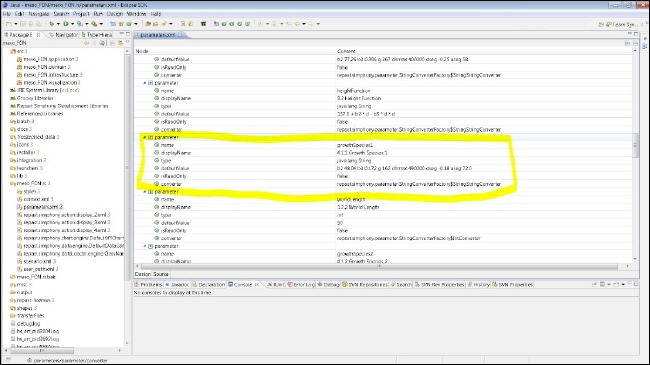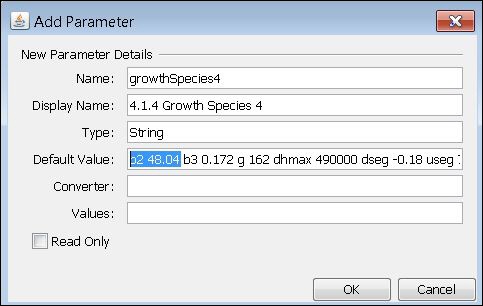Extending the model
Extending the model
|
|
Adding more species is very easy in MesoFON. As shown in Figure 12 species addition can be accomplished using the "Add Parameter" button at the bottom of the "Parameters" pane. |
|
|
Before making new entries in the opening window you have to look up the entries for the included species. You can perform this in the ECLIPSE workbench by going into the "meso_FON.rs" folder using the "Pacakge Explorer" in ECLIPSE and opening (double-clicking) the "Parameters.xml" file therein. |
|
|
Contents of the file will be presented in the ECLIPSE editor then. You can view all parameters by clicking on the "Expand All" button in upper right corner of the editor. Move to one of the parameter entries for the species-specific paraemeters, e.g. " growthSpecies1" and use the entries you find there (compare Figure 11) as examplary guideline for the entries for the new species. Figure 12 shows entries for a Species 4 to be included. |
|
|
Repeat following the instructions for other species-specific parameters and you are done. |
|
|
As long as you keep the original independent variable (e.g. d in "3.1 Growth function") you can enter your own fnctions. Of course, if you have made such changes to one of te functions you have to adjst also parameter names and values for the included species. |
|
|
If you intend to make the tree growth dependent on another state variable, which would represent a more fundamental modification of the model, you have to change the code. If you are familiar with Java that should not be too difficult. The model is entirely transparent and is integrated in the ECLIPSE workbench for any sort of recoding. |
|
|
Just a hint: You find the source code in the FunctionService class inside the "application" package in the "src" folder. |

Fig. 11: Contents of the "Parameters.xml" file. The "Expand All" and the entries of the "growtSpecies1" parameter are rrownded in orange color.

Fig. 12: Add Parameter. The "Add Parameter" button and the popup window for new entries is surrounded in orange color.
Copyright © June 2012 Dr. U. Grueters
(C) 2006 - All rights reserved